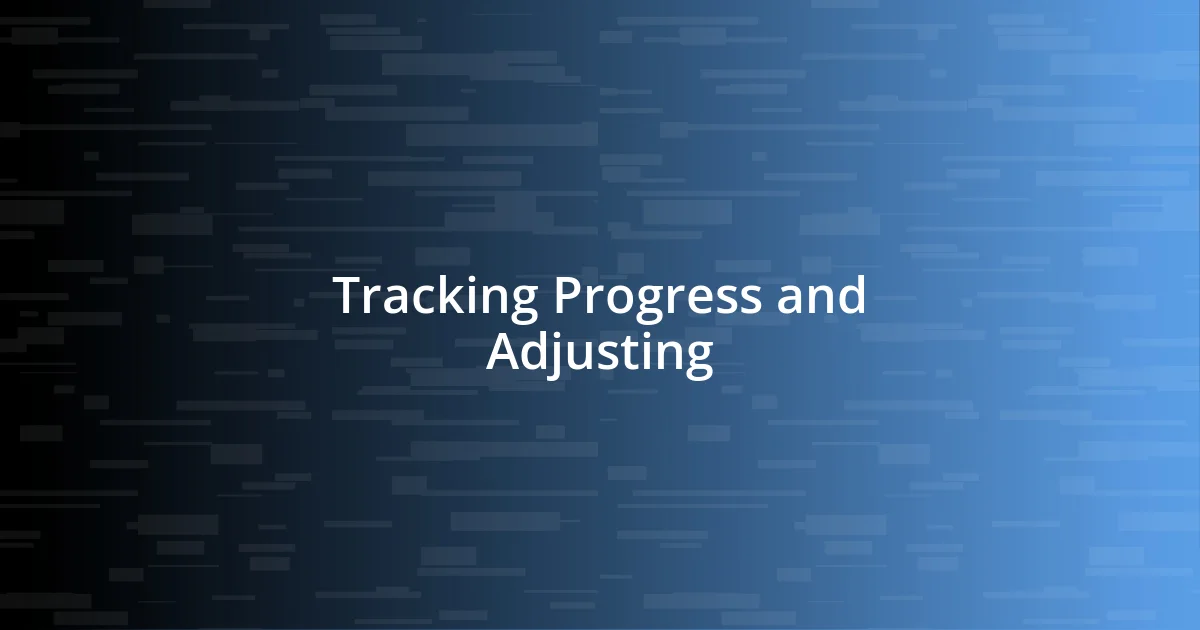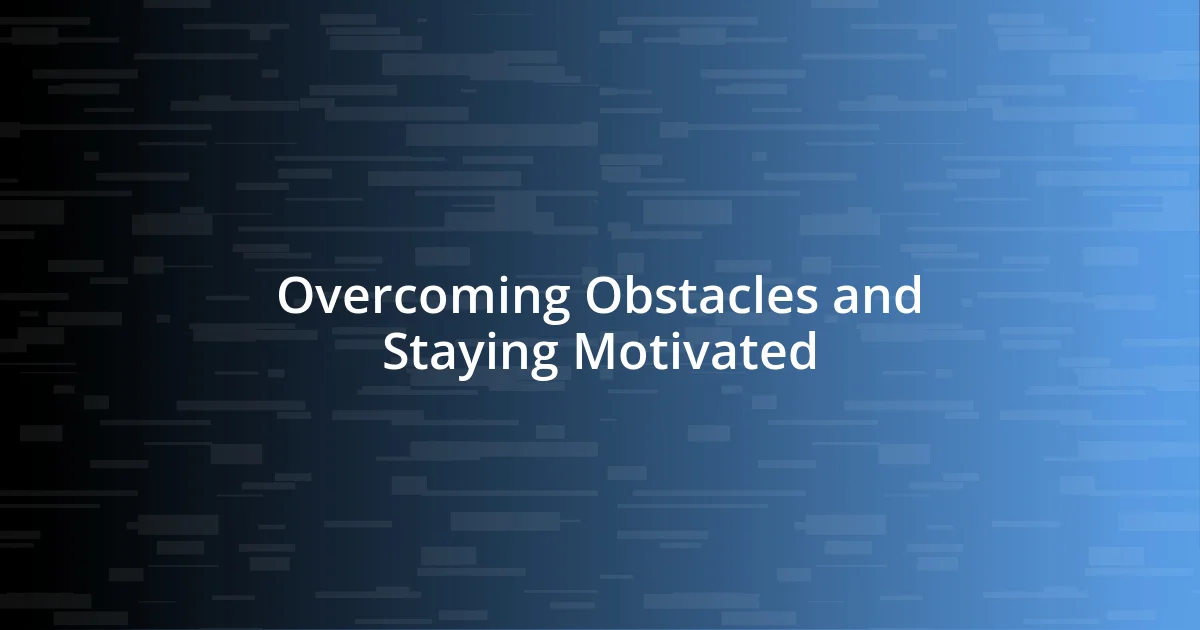Key takeaways:
- Setting realistic goals and breaking them down into smaller milestones creates manageable steps and ignites motivation.
- Defining personal values helps align goals with what truly matters, leading to more meaningful pursuits.
- Utilizing the SMART framework, tracking progress, and celebrating small wins enhances accountability and resilience during challenges.

Understanding the Importance of Goals
Goals serve as the roadmap for our aspirations. I remember when I set a goal to run a half-marathon. At first, it felt overwhelming. But breaking it into smaller steps transformed that intimidating ambition into manageable daily runs. Isn’t it fascinating how a clear direction can turn a dream into a reality?
When I reflect on my experiences, I see that goals can ignite passion and motivation. For instance, after setting a goal to read one book a month, not only did my knowledge expand, but I also found newfound excitement in learning. Have you ever noticed how having something to strive for can brighten your daily routine?
Goals also provide a sense of purpose, anchoring us during challenging times. During a rough patch, I focused on my goal of improving my writing skills. Each word I penned felt like a small victory. It was as if each goal reminded me that progress is possible, even when life throws curveballs. How have your goals steered you through tough situations?

Defining Your Personal Values
Defining your personal values is essential for setting realistic goals that resonate with who you are. When I began to articulate my values, I found clarity in my decision-making process. For instance, family has always been a cornerstone of my life, guiding me in both personal and professional realms. Clearly identifying that value helped me prioritize quality time with loved ones over work obligations, making my goals more meaningful.
In my journey, I’ve learned that personal values act as a compass directing us toward what truly matters. When I noticed my passion for environmental conservation, it shaped my goal to reduce my carbon footprint significantly. This wasn’t merely an abstract notion; it’s a value that transformed how I approach daily choices, like opting for public transport instead of driving. Can you recall a time when a personal value shifted your perspective on your goals?
The process of defining personal values can also reveal areas where adjustments are needed. Once, I found myself caught in the pursuit of career success, compromising my health and relationships. A deep dive into my values helped me recognize that well-being was equally important. By recalibrating my goals to align with my values, I regained balance and fulfillment. How do your values influence your aspirations?
| Personal Values | Impact on Goals |
|---|---|
| Family | Increased focus on quality time and support |
| Health | Enhanced lifestyle choices and balanced goals |
| Environmental Conservation | Shifts to sustainable living approaches |

SMART Goal Setting Framework
Setting realistic goals can become much simpler with the SMART goal-setting framework. For me, understanding this framework transformed how I approach my ambitions. SMART stands for Specific, Measurable, Achievable, Relevant, and Time-bound. Each component plays a crucial role in clarifying what I want to achieve and how to track my progress effectively.
- Specific: My goal to write a book was too vague until I defined it as “completing a draft of my novel by the end of the year.”
- Measurable: Tracking my word count weekly helped me realize I needed to write 500 words daily.
- Achievable: I honestly evaluated my schedule, ensuring I could carve out that time amid life’s distractions.
- Relevant: Writing aligns with my passion, so each step forward felt deeply fulfilling and motivated me further.
- Time-bound: Setting a deadline brought urgency to my routine, which I need to stay driven.
Embracing the SMART framework led me to not just set goals but achieve them in a structured way. It’s like having a personalized map for my aspirations. When I see that progress, no matter how small, it fuels my enthusiasm. Have you ever noticed how clarity makes the journey feel so much more achievable?

Breaking Down Large Goals
Breaking down large goals can feel daunting at first, but the process can be incredibly fulfilling. I remember when I decided to run a marathon; the idea of 26.2 miles seemed overwhelming. Instead of fixating on the end result, I broke it down into smaller, manageable milestones, like training for a 5k first, then moving to a half marathon. Each mini-goal felt like a victory, providing the motivation to keep pushing forward.
I also learned to celebrate even the tiniest achievements along the way. For instance, during my training, each week I’d set a new distance to run. Hitting those weekly targets, like running five miles without stopping, reignited my excitement and made the larger goal feel less intimidating. Has there been a time when achieving a small step propelled you toward a bigger dream?
Ultimately, how we break down our goals can significantly influence our journey. I’ve found that staying flexible with my approach allows me to adjust when life throws surprises my way. For example, during my marathon training, unexpected work commitments sometimes interrupted my schedule. Instead of feeling defeated, I would reassess, allowing myself to swap days or reduce distances temporarily. Embracing that flexibility helped me maintain my focus and persistence. How do you adapt your plans when challenges arise?

Establishing a Timeline for Goals
Setting a timeline for my goals has been a game-changer in my journey. When I decided to lose weight, I mapped out a realistic timeline that included monthly check-ins rather than overwhelming myself with the end goal. This approach not only eased my anxiety but also made me more accountable. Have you ever felt pressured by a distant goal? It’s liberating to break it down into a timeline that feels manageable.
During a particularly busy season, I found that planning specific deadlines for each milestone kept me on track. For instance, I aimed to lose five pounds by a certain date, and this ticking clock was a motivator. I noticed that when I had a clear timeframe, I was less likely to veer off course. I would even mark my calendar with rewards for hitting those targets. Isn’t it satisfying to treat yourself for progress?
I’ve also learned that it’s crucial to remain flexible within that timeline. Life happens! One time, an unexpected project at work consumed my time, and I had to push back my target date. Instead of feeling discouraged, I adjusted my goals and focused on maintaining my healthy habits, like meal prepping on weekends. This adaptability helped me to avoid setbacks and understand that timelines are guides, not rigid barriers. How do you find balance between ambition and life’s unpredictability?

Tracking Progress and Adjusting
Tracking my progress has been an enlightening experience. Each week, I would jot down my victories – even small ones like sticking to my meal plan or fitting in that extra workout. It’s fascinating how documenting these moments sparks a sense of accomplishment, isn’t it? When I look back, I can see how those little successes build momentum, helping me stay focused on the path ahead.
Adjusting my goals is just as important as tracking them. I vividly recall a time when my running pace plateaued, and I felt frustrated. Instead of pushing harder, I took a step back and evaluated my training approach. After discussing with a coach, I incorporated interval training, which breathed new life into my routine. Sometimes stepping back allows for a fresh perspective, making room for growth. How often do we overlook these opportunities for adjustment?
I believe that the process is inherently dynamic. There was a moment when my career took a different turn, and having to balance my personal goals with new responsibilities was challenging. I learned to reprioritize by reassessing my goals regularly. It’s amazing how adapting to life’s changes can keep us aligned with what truly matters. Have you ever experienced a shift that forced you to reevaluate your priorities? Embracing these shifts can lead to unexpected avenues of progress.

Overcoming Obstacles and Staying Motivated
Staying motivated while facing obstacles is a challenge many of us encounter. I remember a time when I aimed to complete a marathon, but a knee injury sidelined me. The frustration was palpable, and I felt lost in my training. Instead of giving up, I shifted my focus to cross-training, which not only kept me active but also reignited my passion for fitness. Have you ever had to pivot like that? It’s incredible how adapting to hurdles can lead to unexpected growth.
It’s essential to cultivate resilience when challenges arise. On days when motivation wanes, I remind myself of my ‘why’. When I choose to pursue a healthier lifestyle, picturing my goals—like feeling more energetic or fitting into my favorite clothes—fuels my determination. I often think, what keeps you going when the going gets tough? For me, surrounding myself with supportive friends has made a significant difference. Their encouragement during tough moments can really boost my spirits.
I’ve also found it beneficial to celebrate small wins, no matter how tiny they might seem. There was a month when I struggled to maintain my workout routine, but I committed to just ten minutes a day on days I felt particularly drained. Each of those little check-ins reminded me that every effort counts. How often do we dismiss those incremental achievements? Every step, no matter how small, inches us closer to our goals and reinforces our motivation.














